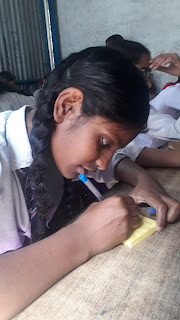An entrepreneurship and innovation-focused non-profit program called “Impact Week” was organized for the first time in Nepal.
Hosted by King’s College in Kathmandu in collaboration with Germany’s Lufthansa Group Airlines, the Impact Week was conducted in two phases. In the first phase, seven European experts coached 18 Nepalese academic professionals and 18 international professionals about the “design thinking” methodology.
Similarly, in the second phase, the trained Junior Coaches guided about 120 students and young professionals from diverse colleges and field of studies through a design thinking process over a course of 4 days Impact Week Challenge to solve pressing local and national level challenges.
On 14th November, during the closing ceremony of Impact Week Challenge, all 18 teams pitched their final prototype solutions to a jury panel of international and Nepalese executives. Three teams received Lufthansa Group Impact Awards worth 1.5 Lakhs, 1 Lakh & 75 Thousand respectively in the form of financial aid to support the teams with implementing their solutions. The closing ceremony had the honorary presence and keynotes from Hon. Gokarna Bista, Minister for Labour, Employment & Social Security, Hon. Bidya Sundar Shakya, Mayor of Kathmandu and Mrs. Andrea Pernkopf, Managing Director of Lufthansa Help Alliance, Germany.
Alongside the support of Lufthansa’s social arm - help alliance - and the Embassy of the Federal Republic of Germany in Kathmandu, representatives from various European multinational companies had come together to bring this global event to Nepal.
The Impact Week in Nepal was organized by a team of volunteers from Lufthansa Systems including the lead organizers Aman Bhattarai and Tilo Hillmer, and the lead coach Danny Tobisch. They are experts in their respective fields with a rich background of participating in Impact Week programs around the world.
The challenges addressed during the Impact Week were focused on six areas including, Agriculture, Tourism, Mobility, Arts & Culture, Health and Education. The six tracks will be mentored by the following local organizations respectively: Eco Himal Nepal, Nepal Tourism Board, Tootle, Kathmandu City Planning Commission, Hospital for Advanced Medicine & Surgery, and King’s College.
The German Ambassador to Nepal, Roland Schäfer expressed his admiration for the changing outlook of Nepal in the global scenario, from a country known for its beautiful mountain-ranges to becoming a country working on finding innovative solutions to its problems, which encourages development based on ideation and technological advancements.
“Knowledge and skills are the most precious things that are needed to foster Nepal’s economic and social development. I am excited to welcome global innovation experts, my colleagues from the Lufthansa Group and their skills and methodologies to Kathmandu and hope to foster user-centric social innovation growth among Nepalese youths through this unique collaboration,”
said Aman Bhattarai, Senior Consultant at zeroG – a Lufthansa Group company – and lead organizer of the Impact Week Kathmandu.
While Saroj Basnet, Vice-chairman, KMC City Planning Commission, added
“We are proud to collaborate with the Lufthansa Group and King’s College on the Impact Week program and are confident that the event will enable youths to think in a more user-centric way while pursuing their innovation journey.”
Narayan Dhakal, Managing Director, Eco Himal Nepal, stated, “All the six tracks are of utmost importance for the socio-economic development of the country. We are inspired and look forward to a huge impact of this event.”
“This event based on design-thinking approach towards solving real problems posed by the organizations in Nepal, engages the young minds of Nepalese students and professionals in the process and is an initiative towards ideating innovative solutions to our problems in a collaborative manner,”
says Executive Director of King’s College, Narottam Aryal.
Overall, the program facilitates participants to connect with like-minded people from Kathmandu valley and around the world, to learn from both the experts and each other, and to create a real impact for their community and country. It contributes towards promoting innovation and entrepreneurship in emerging economies as the basis for sustainable growth.
With the help of the design thinking method, local students and young professionals are empowered to develop the business ideas of their own and solutions to solve problems in their local or wider community.
This German award-winning program was established in 2015 in Kenya and has been successfully held in various emerging economies across the world. This year’s locations include India, Jordan, Ghana and Nepal.

























